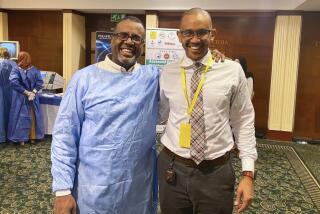Hussein Ordered Him Killed, Iraqi Physician Testifies
- Share via
An Iraqi physician who is seeking refuge in the United States from dictator Saddam Hussein testified Monday in U.S. Immigration Court that he was ambushed twice by gunmen in northern Iraq a few months after Hussein’s regime issued a death warrant for him.
Dr. Ali Yasin Mohammed Karim, 37, discussed the purported attacks and execution order in response to the U.S. Immigration and Naturalization Service’s charge that he might be a spy for a Middle-Eastern power and should be denied entry into the United States.
Testifying before Judge D.D. Sitgraves in the U.S. Immigration Court on Terminal Island, Karim said the Iraqi government ordered his “execution in absentia” on Jan. 16, 1996, because of his anti-Hussein political activities.
Almost two months later, on March 5, a motorcade carrying officials of the Iraqi National Congress was fired on as it traveled through the village of Malla Omar in northern Iraq, Karim said. Four bullets, he said, struck the vehicle in which he was a passenger.
Karim said he was shot at again as he drove through the same village on March 8.
He told the court that members of the Iraqi National Congress and the Patriotic Union of Kurdistan, another opposition group, arrested two young men in connection with the shooting.
Karim has been in federal custody since he was evacuated by the U.S. government from northern Iraq as Hussein’s troops attacked opposition groups in late 1996.
If he prevails, he will be granted the right to apply for political asylum.
According to his testimony, the doctor believes that Hussein’s government is responsible for the shootings because of the execution order.
He said a friend of his who worked for the Iraqi government warned him about the order and later provided him a copy of it. A copy of the purported order also has been turned over to the court.
Karim testified that he will “definitely be executed” if the United States returns him to Iraq.
Niels W. Frenzen, one of the doctor’s attorneys, contends that Karim should be allowed to stay in the United States because of the threats to his life.
He said the execution order and shootings counter the government’s claim that he might be a spy for Hussein.
Attorneys for the INS contend that there is a reasonable belief that Karim is a danger to national security based on FBI interviews and background checks of Iraqi refugees.
They say that one of the doctor’s cousins is a suspected Iranian intelligence agent, the doctor’s travel patterns are suspicious, and he might have misled federal agents about how his brother made it into the United States.
Under questioning by INS attorneys Monday, Karim disputed FBI statements that he had traveled “many times” to Iran between 1974 and 1991--an indication to authorities that he might have ties to Iranian intelligence operations.
The doctor testified that he traveled to neighboring Iran no more than two or three times during those years, and no more than five times in his life. “I can’t say that he [the FBI agent] is lying,” Karim said, “but what he is saying is incorrect--100%.”
In subsequent questioning, INS attorneys turned to whether Karim misled FBI officials about the way his mentally ill brother, Mohammed, managed to be evacuated from northern Iraq in October 1996.
Testimony has indicated that Mohammed assumed the name of a person who was on the evacuation list but who decided to stay behind. He apparently did so with the approval of the man’s mother.
But the FBI has quoted Karim as saying he made up the name for Mohammed in 1993 because members of the Iraqi National Congress often used aliases.
In court Monday, Karim, who claims to have become a member of the organization in 1994, testified that he never made up a name for his brother.
The doctor testified that when he and his brother arrived at the U.S. refugee center on Guam, he went to INS officials to inform them that his brother had assumed the identify of another person on the evacuation list.
More to Read
Sign up for Essential California
The most important California stories and recommendations in your inbox every morning.
You may occasionally receive promotional content from the Los Angeles Times.














